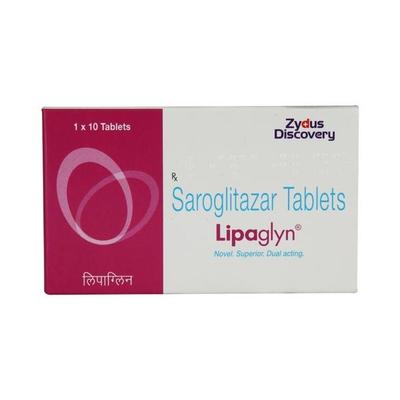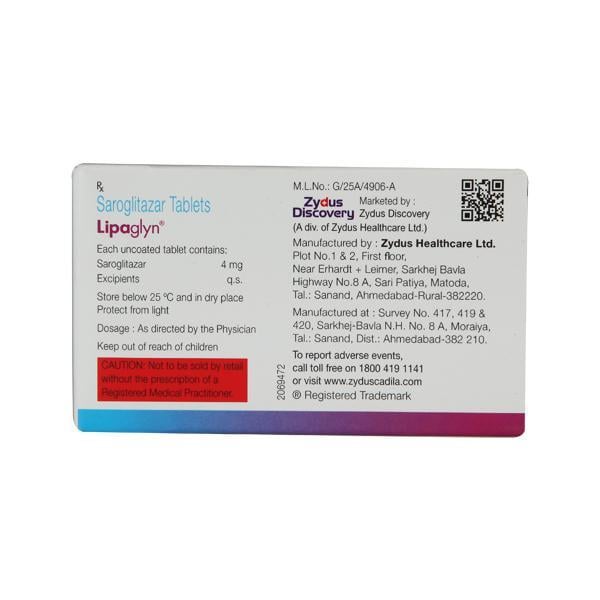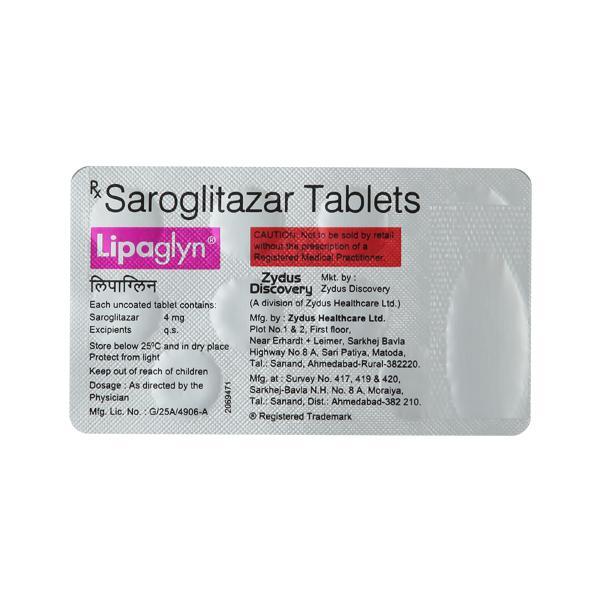

Netmeds First Membership
Quick Links
Introduction About LIPAGLYN 4MG TABLET
What is Lipaglyn 4mg Tablet?
Lipaglyn 4mg Tablet is a prescription medicine used for managing diabetic dyslipidemia and hypertriglyceridemia in patients with type 2 diabetes.
Lipaglyn 4mg should be used with caution in patients having liver, kidney or heart disease (with episodic congestive heart failure) and history of muscle diseases. Lipaglyn 4mg should be used with caution in elderly patients.
Safety and effectiveness of this medicine has not been established in children, hence, ask for your doctor’s advice before taking the medicine.
The most common side effects of taking Lipaglyn 4mg are nausea, headache and mild gastrointestinal discomfort. Consult your doctor if any of the above side effects persists for a longer duration.
Key Composition
Active ingredients of Lipaglyn 4mg:
- Active ingredient: Saroglitazar (4mg)
- Drug Class: PPAR (Peroxisome Proliferator-Activated Receptor) α/γ agonist
Uses Of LIPAGLYN 4MG TABLET
- Diabetic dyslipidemia
- Hypertriglyceridemia
Benefits of LIPAGLYN 4MG TABLET
- Helps in managing diabetic dyslipidemia - Effectively controls abnormal lipid levels in Type 2 Diabetes patients
- Reduces triglycerides and LDL cholesterol - Lowers bad cholesterol, reducing the risk of heart disease
- Improves lipid profile in type 2 diabetes patients - Increases HDL (good cholesterol) for better cardiovascular health
How LIPAGLYN 4MG TABLET Works
How Lipaglyn 4mg works to control Diabetic dyslipidemia:
1. Lipid-Lowering effect (PPAR-α Activation)
- Reduces triglycerides & LDL (Bad Cholesterol): Stimulates lipid metabolism, lowering triglyceride and LDL cholesterol levels
- Increases HDL (Good cholesterol): Enhances lipid balance, promoting cardiovascular health
- Manages diabetic dyslipidemia: Effectively controls abnormal lipid levels in Type 2 Diabetes patients
2. Glucose-regulating effect (PPAR-γ Activation)
- Enhances insulin sensitivity: Helps the body utilize insulin more efficiently, improving blood sugar control
- Lowers fasting plasma glucose: Aids in reducing blood sugar levels in diabetic patients
How to use LIPAGLYN 4MG TABLET
Lipaglyn 4mg is a prescription medicine which needs to be taken under medical supervision. Always consult your doctor or pharmacist if you have any questions or concerns about taking this medication.
Recommended daily dose of Lipaglyn 4mg:
- Usual daily dose: 4 mg once daily
- Administration: Take with or without food at the same time every day
- Do not exceed the prescribed dose without medical advice
How to take Lipaglyn 4mg Tablet for Best Results:
- Take Lipaglyn 4mg as advised by your doctor
- Swallow the medicine with a glass of water. Do not crush or chew the medicine
- Your doctor will decide the correct dose and duration for you depending upon your age, condition, and body weight
When to take Lipaglyn - Before or After Food?
- Lipaglyn can be taken with or without meals as food does not affect its absorption
- However, it is best to take it at the same time every day for maximum effectiveness
What if I forgot to take LIPAGLYN 4MG TABLET
Missed dose instructions for Lipaglyn 4mg Tablet:
- Take the missed dose as soon as you remember
- If it is almost time for your next scheduled dose, skip the missed dose and continue with your regular schedule
- Do not double the dose to make up for the missed one
Overdose
An overdose of Lipaglyn 4mg Tablet may lead to serious metabolic and systemic complications, including:
- Severe hypoglycemia (low blood sugar)
- Severe hypotriglyceridemia (low triglycerides)
- Liver damage (hepatotoxicity)
- Kidney dysfunction
- Gastrointestinal issues
- Muscle weakness or pain
Side Effects Of LIPAGLYN 4MG TABLET
Common side effects include:
- nausea
- headache
- mild gastrointestinal discomfort
How To Manage Side Effects
Headache
- Applying a cold compress (like a cool towel or ice pack) to your forehead can help relieve headache
- Make sure your sleeping environment is comfortable and conducive to rest
- Make sure to drink plenty of water throughout the day. Aim for 8 glasses (2 liters) of water unless otherwise advised by your doctor
Nausea And Vomiting
- Taking Lipaglyn with or after a meal can help reduce nausea
- Drink plenty of water throughout the day to stay hydrated
- Avoid heavy, greasy, or spicy foods that could irritate your stomach
Stomach Discomfort
- Try having a light meal or snack when taking your medicine
- Limit or avoid foods like beans, cabbage, onions, carbonated drinks, and dairy
- Instead of eating large meals, try eating smaller, more frequent meals
Warning & Precautions
Pregnancy
Consult your doctorThere are no well-controlled human studies on the use of Lipaglyn 4mg during pregnancy. Since Lipaglyn 4mg is a newer drug used primarily for dyslipidemia and diabetes management, data on its safety in pregnant women is limited.
Breastfeeding
Consult your doctorThere is no clinical studies have been conducted to evaluate whether Saroglitazar is excreted in human breast milk. Due to the lack of sufficient safety data, breastfeeding mothers are advised to avoid using Lipaglyn 4mg Tablet unless absolutely necessary.
Driving and Using Machines
Use with CautionLipaglyn 4mg does not usually impair alertness, but if you experience dizziness or fatigue, avoid driving or operating heavy machines.
Alcohol
Consult your doctorAvoid alcohol while taking Lipaglyn 4mg Tablet, as it may increase the risk of liver problems.
Kidney
Use with CautionLipaglyn 4mg should be used with caution in patients with abnormal kidney function.
Liver
Use with CautionLipaglyn 4mg should be used with caution in patients with abnormal liver function.
Allergy
ContraindicatedDo not take Lipaglyn 4mg if you are allergic to Saroglitazar or any other ingredients of this medicine.
Heart Disease
Use with CautionLipaglyn 4mg should be taken with caution in patients with type 2 diabetes mellitus having heart diseases with episodic congestive heart failure.
Use In Pediatrics
Consult your doctorSafety and effectiveness of Lipaglyn 4mg has not been established in children.
Use In Geriatrics
Use with CautionLipaglyn 4mg should be used with caution in elderly patients. Consult with your doctor before taking.
Others
Other Warnings for LIPAGLYN 4MG TABLET
Before taking Lipaglyn 4mg, inform your doctor if you:
- have muscular diseases (myopathies)
Safety Advice
- Lipaglyn is not recommended due to lack of sufficient human studies and potential risks seen in animal studies
- Avoid during breastfeeding, as it is unclear whether Lipaglyn passes into breast milk and could affect the baby
- Avoid alcohol while taking Lipaglyn, as it may increase the risk of liver problems and worsen lipid or blood sugar control
- Lipaglyn may improve blood sugar control, so monitor blood glucose levels regularly if you have diabetes
- Lipaglyn does not usually impair alertness, but if you experience dizziness or fatigue, avoid driving or operating heavy machines
- Lipaglyn 4mg may interact with other cholesterol-lowering drugs, diabetes medications, and certain antibiotics or antifungal drugs
Diet and Lifestyle Advice
Foods that enhance Lipaglyn’s effectiveness:
- High-fiber foods: Oats, barley, whole grains, lentils, beans, and chickpeas, green leafy vegetables
- Healthy fats: Nuts & seeds, fatty fish, olive oil & avocado
- Protein-rich foods: Lean meats (chicken, turkey), eggs, paneer, tofu, and greek yogurt
- Low-glycemic index: brown rice, quinoa, millets, non-starchy vegetables (broccoli, carrots, bell peppers), berries
Foods that may reduce Lipaglyn’s effectiveness:
- Sugary & processed foods: sweets, cakes, pastries, candies
- Sugary drinks: soda, packaged juices, white bread, refined cereals
- Unhealthy fats
- Fried foods: pakoras, samosas, deep-fried snacks
- Processed meats: sausages, bacon, hot dogs
- Full-fat dairy: excess butter, ghee, heavy cream
- High-sodium foods: chips, canned soups, pickles
Why Doctors recommend Lipaglyn for type 2 Diabetes patients?
1. Controls both blood sugar & lipid levels
- PPAR-α Activation → Lowers triglycerides (TGs), LDL, and VLDL, and raises HDL
- PPAR-γ Activation → Improves insulin sensitivity, helping lower blood sugar
2. Ideal for Diabetic dyslipidemia
- Many type 2 diabetes patients also have high cholesterol & triglycerides, increasing heart disease risk
- Lipaglyn effectively reduces TGs by 45-50% and increases HDL by 15-20%, lowering cardiovascular risk
3. Reduces risk of cardiovascular diseases
- High triglycerides and LDL contribute to atherosclerosis
- Lipaglyn helps protect the heart by improving lipid balance and reducing inflammation
4. Safer alternative to fibrates & other lipid-lowering drugs
- Better tolerability: Lipaglyn has a lower risk of muscle toxicity compared to statins and fibrates
- Kidney-friendly: Unlike fibrates, Lipaglyn is safer for kidney health
5. Helps in Non-alcoholic fatty liver disease
- Usually Diabetics develop fatty liver disease due to high triglycerides and insulin resistance
- Lipaglyn reduces liver fat and inflammation, helping to reduce liver complications
6. Minimal side effects & well-tolerated
- Most patients tolerate Lipaglyn well, with mild side effects like nausea or headache in some cases
- It does not cause weight gain, unlike some other diabetes medications
Lipaglyn 4mg vs other lipid-lowering medications – Which is better?
1. Lipaglyn vs Statins (e.g., Atorvastatin, Rosuvastatin, Simvastatin)
|
Feature |
Lipaglyn 4mg |
Statins |
|
Primary Action |
lowers triglycerides (TGs) & improves insulin sensitivity |
Lowers LDL (bad cholesterol) |
|
Triglyceride Reduction |
45-50% |
10-30% |
|
LDL Reduction |
Mild (5-10%) |
30-50% |
|
HDL increase |
Moderate (15-20%) |
5-15% |
|
Effect on blood sugar |
Improves insulin sensitivity |
May slightly increase blood sugar |
|
Liver & muscle safety |
Generally safe |
Can cause liver enzyme elevation & muscle pain |
|
Best for |
Diabetic dyslipidemia (high TGs + diabetes) |
High LDL & heart disease risk |
Which is better?
- For high triglycerides + diabetes → Lipaglyn is better
- For high LDL cholesterol → Statins are more effective
- For mixed dyslipidemia (high TGs & high LDL) → Combination of Lipaglyn + statin may be ideal
Drug - Drug interaction
Lipaglyn 4mg Drug Interactions - What you should avoid?
1. Statins (Atorvastatin, Rosuvastatin, Simvastatin)
- Risk: It may slightly increase liver enzymes (ALT, AST) and, in rare cases, cause muscle pain
- Precaution: Regular liver function tests (LFTs) and monitoring for muscle pain are recommended
2. Insulin & Sulfonylureas (Glimepiride, Gliclazide, Glibenclamide)
- Risk: Increases the risk of low blood sugar
- Precaution: Frequent blood sugar monitoring is needed. Dose adjustment may be required
3. Fibrates (Fenofibrate, Gemfibrozil)
- Risk: Both Lipaglyn and fibrates lower triglycerides, but combining them may increase the risk of liver toxicity and muscle damage
- Precaution: Avoid using both together unless absolutely necessary. Monitor liver enzymes and muscle pain symptoms
4. Warfarin & Blood thinners
- Risk: Lipaglyn may enhance the blood-thinning effect, increasing the risk of bleeding
- Precaution: Monitor INR levels closely and adjust the warfarin dose if needed
5. Pioglitazone (another PPAR-γ Agonist)
- Risk: Combining Lipaglyn with Pioglitazone may increase the risk of water retention, swelling (edema), and weight gain
- Precaution: Avoid using both drugs together unless prescribed by a doctor. Monitor for fluid retention and heart issues
Synopsis
| Drug | : | Saroglitazar |
| Pharmacological Category | : | PPAR agonist |
| Therapeutic Indication | : | Diabetic Dyslipidaemia, Hypertriglyceridemia with Type 2 diabetes mellitus |
| Dosage Forms | : | Tablet |
More Information
Natural supplements that can support Lipid Management:
- Omega-3 fatty acids (fish oil, flaxseed oil)
- Red yeast rice
- Vitamin B3
- Garlic extract
10 things to ask your doctor before taking Lipaglyn:
- Why do I need Lipaglyn - Understanding your specific condition helps in monitoring effectiveness
- How does Lipaglyn work for my condition - Lipaglyn works by lowering cholesterol & triglycerides and improving insulin sensitivity
- How long will it take to see results?
- Can I take Lipaglyn 4mg Tablet with my current medications?
- Are there any serious side effects I should watch for?
- Do I need any medical tests before or during treatment?
- What lifestyle changes should I follow while taking Lipaglyn Tablet?
- Who should not take Lipaglyn 4mg?
- Can I stop taking Lipaglyn if my lipid levels improve?
- What should I do if Lipaglyn does not work for me?
FAQs About LIPAGLYN 4MG TABLET
Q: What is Lipaglyn 4mg used for?
A: It is used for managing diabetic dyslipidemia and hypertriglyceridemia in patients with type 2 diabetes.
Q: Can Lipaglyn 4mg be taken with other diabetes medications?
A: Yes, Lipaglyn 4mg can be taken with other diabetes medications, but with caution and under medical supervision. It is often prescribed alongside other glucose-lowering drugs to improve both lipid and blood sugar control in type 2 diabetes patients.
Q: Does weight gain a side effect of Lipaglyn?
A: No, Lipaglyn 4mg does not typically cause weight gain. It may help with weight management, especially in patients with diabetic dyslipidemia and fatty liver disease.
Q: Does Lipaglyn interact with statins?
A: Lipaglyn can be safely taken with statins, and in many cases, doctors prescribe them together for better lipid control. However, some precautions should be considered.
Q: Who should not take Lipaglyn 4mg Tablet?
A: Patients with mild to moderate liver disease, type 1 diabetes, patients on multiple medications should not take while taking Lipaglyn Tablet.
Q: How does Lipaglyn work?
A: Lipaglyn is a dual PPAR agonist that helps control both diabetes and dyslipidemia.
Q: Can Lipaglyn 4mg be given to pregnant and breast-feeding women?
A: Lipaglyn 4mg Tablet should be used with caution in pregnant women only if the potential benefits are more than the risks involved. It is not recommended for use in breastfeeding women as it is not known if it passes through breastmilk.
Q: Can Lipaglyn 4mg be taken by patients having heart diseases?
A: Lipaglyn 4mg should be taken with caution in patients with type 2 diabetes mellitus having heart diseases with episodic congestive heart failure.
Q: Can Lipaglyn 4mg interact with other medical conditions?
A: Before starting Lipaglyn 4mg tablet, inform your healthcare provider about any medical conditions you have, especially gastrointestinal disorders such as bowel obstruction or severe constipation. It should be used with caution in patients with these conditions.
Q: Can I drink alcohol while taking Lipaglyn 4mg?
A: It is important to consult your healthcare provider regarding alcohol consumption while taking Lipaglyn 4mg, as alcohol may interact with certain medications and could affect the kidney function.
Q: What should I do if I experience severe side effects while taking Lipaglyn 4mg?
A: If you experience severe side effects such as difficulty breathing, severe abdominal pain, or allergic reactions (e.g. rash, itching, swelling), seek immediate medical attention and discontinue the use.
Q: Can I stop taking Lipaglyn 4mg if my phosphate levels improve?
A: Do not stop taking Lipaglyn 4mg without consulting your healthcare provider, even if your phosphate levels improve. Stopping the medication abruptly could cause your phosphate levels to rise again. Your healthcare provider will determine the appropriate duration of management based on your condition.
Q: Is Lipaglyn safe for long-term use?
A: Yes, Lipaglyn is generally safe for long-term use, especially in patients with Type 2 diabetes and diabetic dyslipidemia. Clinical studies and real-world use suggest good tolerability and effectiveness over extended periods.
Q: How long does it take for Lipaglyn 4mg to start working?
A: The onset of action of Lipaglyn 4mg may vary from person to person. Some individuals may start to see a reduction in phosphate levels within a few days of starting management, while others may require several weeks. It is important to monitor phosphate levels regularly as directed by your healthcare provider.
Q: Can I take Lipaglyn with metformin or insulin?
A: Yes. Saroglitazar can be safely taken with Metformin or Insulin. Doctors often prescribe these combinations for better diabetes and lipid control.
Q: Where to buy Lipaglyn 4mg online at the best price?
A: You can purchase Lipaglyn 4mg Tablet from online reputable pharmacy like Netmeds.
Q: What to do if Lipaglyn doesn’t work?
A: If Lipaglyn 4mg Tablet is not providing the expected results, consult your doctor before stopping or switching medications. There are alternative therapies available for managing cholesterol and triglycerides effectively.
References
- KD. Tripathi. Hypolipidemic Drugs. Essentials of medical pharmacology. Eighth edition. 2018. Page – 688.
- Shaival Chandalia. Hydroxychloroquine: Old wine in a new bottle & Saroglitazar: New Kid on the Block. Association of Diabetes Educators. Journal of Diabetes Education. March 2019. [Accessed on 19th February, 2025]

- Mukul R Jain, Suresh R Giri, Chitrang Trivedi, Bibhuti Bhoi, Akshyaya Rath, Geeta Vanage, Purvi Vyas, Ramchandra Ranvir, Pankaj R Patel. Saroglitazar, a novel PPARα/γ agonist with predominant PPARα activity, shows lipid-lowering and insulin-sensitizing effects in preclinical models. NIH National library of medicine. National centre for biotechnology information. Pubmed.gov 2015. [Accessed on 19th February, 2025]

- Cadila Healthcare Limited. Lipaglyn. [Accessed on 19th February, 2025]











